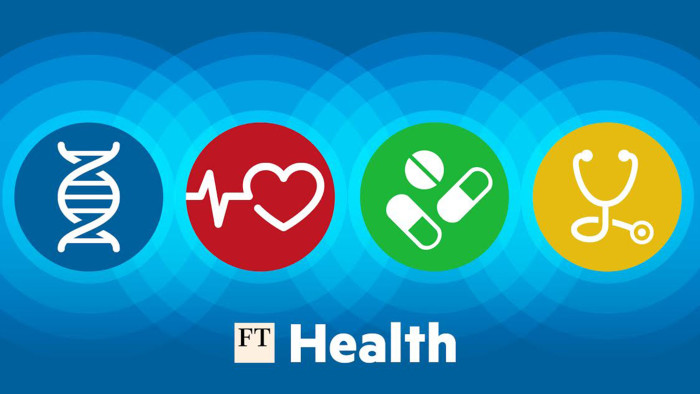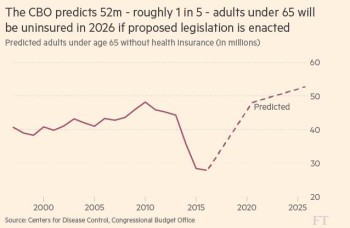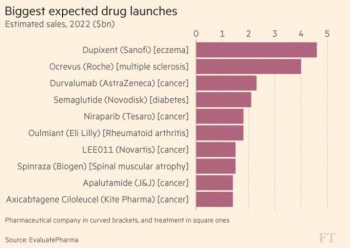FT Health: Making America unhealthy again

Roula Khalaf, Editor of the FT, selects her favourite stories in this weekly newsletter.
It may not be good for the country, but Donald Trump is at least proving consistent. As he promised in his election campaign, so the new president is proposing in his first budget. As he unveils cuts at home, so he plans to slice deeply abroad. Americans and others around the world risk suffering as a result.
For those in the US, “Trumpcare” threatens to apply a chainsaw to his predecessor’s health insurance programme when it merits a scalpel instead.
Despite their limitations, Obamacare's achievements in increasing the number of Americans with coverage would be reversed. That could prove an own goal against many of his supporters. There are few signs of public health measures to tackle the rising tide of preventable chronic disease.
For those in other countries, chopping more than a quarter from the budgets of the State Department and USAID, and restated hostility to UN organisations and the World Bank, would significantly depress foreign aid. For people everywhere, squeezing a fifth out of the $32bn annual budget of the National Institutes of Health will put pressure on future medical research.
There are some important nuances. Domestically, opioid abuse support and community healthcare programmes aimed at the poor are ringfenced, while measures against emerging infections such as Zika will be stepped up. Internationally, it is good that current US commitments to multilateral global health programmes — to Gavi, Pepfar, PMI and the Global Fund to Fight Aids, TB and Malaria — are explicitly preserved. Ironically, that implies the bulk of funding reductions will fall on bilateral USAID grants (and the Americans who work on them).
Most fundamentally, of course, the president’s healthcare reforms and budget proposals have yet to pass through Congress, where Republicans as well as Democrats are starting to show their teeth. Even if many elements do eventually pass into law, there remains much haggling over the small print, while the money saved will be dwarfed by the expansion in defence spending. The shift from soft diplomacy to military strength, and from long-term investments in research to short term symbolic gestures risks painful long term consequences.
Andrew Jack
————————————————————————————————————–
Three questions
Sania Nishtar: first of our interviews with the three candidates for director-general of the World Health Organization.
What is the strongest argument to vote for you rather than the other DG candidates?
I have been a change-maker my entire career and one thing WHO needs now is that. I have delivered results in the most difficult and resource-constrained settings with integrity and transparency. I have led on hard issues in ways that are sustainable and constructive. I would accelerate reforms and drive an accountability revolution across the organisation to reclaim its reputation and restore trust in its ability to act as the world’s lead health agency.
What is the one WHO programme you would scale up and the one you would de-prioritise?
I will definitely scale up the health emergencies programme. Exercising stewardship to protect the world against infectious threats is WHO’s exclusive mandate. WHO is governed by 194 member states, which have a sovereign right to bring diverse issues to the table. But I am not afraid of a meaningful discussion with them on priority setting, and will drive tangible outcomes. My New Vision for WHO hinges on leveraging its comparative advantages and normative role, which will involve stepping back from noncore roles, in any case.
You have strong NGO experience but do you have a sufficient track record and backing to run a large international organisation?
I have extensive experience of governance and management. I have served on the boards of very large national and international organisations. I have created organisations from scratch and managed them successfully. I have a track record of driving reform and the highest standards of accountability and governance throughout my career in government, civil society, research and in international agencies. I’m also a leader that knows what I don’t know and I would surround myself with the most talented people from around the world and work with member states to drive forward the reforms needed to make WHO more fit for purpose and the people it serves living longer, healthier lives.
Read more from the Kaiser Family Foundation on the US government and the WHO.
——————————————————————————————————————-
Chartwatch
Dupixent, the eczema drug discovered by Regeneron and marketed by Sanofi, is set to be the biggest blockbuster drug of 2017 with potential annual revenues of $4.6bn if passed by US regulators. There are currently no approved medicines for moderate or severe atopic dermatitis, which affects 8.5m adults in the US and the EU. (FT)
——————————————————————————————————————-
News round-up
African famine warning The UN says the world is facing its largest humanitarian crisis since the organisation was founded in 1945. It says that 20m people face “devastating levels of food insecurity” in Yemen, South Sudan, Somalia and north-east Nigeria. (FT, Guardian)
Zika fears grow Bernie Sanders railed against the decision to license an experimental Zika vaccine to Sanofi without any assurances on pricing. The US senator pointed to the $1bn already spent by US taxpayers on anti-Zika measures. The disease continues to ravage families in Brazil while the Centers for Disease Control and Prevention raised the alarm in Miami over possible infections from donated sperm. (NYT, CDC)
Bird flu The H5N8 strain hit Nepal for the first time, while France, the Czech Republic, Germany and Hungary have confirmed more cases. In the US, shares in Tyson and other food producers were hit after a second case was confirmed in Tennessee. (Cidrap, FT)
India The country is home to many generic drugmakers but its pharma sector could be hit by President Trump's “America first” emphasis. (Stat)
Trumpcare The non-partisan Congressional Budget Office said the president's proposals would leave 24m more Americans without health insurance. Many of the worst affected are older, white voters — a large proportion of which put Mr Trump in power. The WSJ lamented the "circular firing squad" (video) but some conservatives were more supportive, lauding Paul Ryan’s plan and pointing to the positive effect on the US deficit, thanks to reduced spending on Medicaid. A poll showed the public remained sceptical. (FT, LA Times, National Review, WSJ, Kaiser Foundation)

US regulation Scott Gottlieb, the president’s choice for commissioner of the Food and Drug Administration, has the task of delivering Mr Trump’s promise to axe red tape and shorten approval processes for new drugs. He has been criticised by some by being too close to Big Pharma but others say he’s the right choice to lighten the regulatory load. (FT, WSJ)
ARV disruption risk Just four companies supply the bulk of antiretroviral medication for HIV to poorer countries, and regulatory issues could create shortages. (FT)
Rare diseases Companies specialising in drugs for rare diseases hit out at stricter UK proposals for approving new treatments. Regulators say medicines costing more than £100,000 for an extra year of good-quality life will no longer be funded automatically. Companies such as Alexion have queried the government's commitment to the life sciences sector. (FT)
UK health spending Drug pricing is but one of many problems facing the country's National Health Service. Nick Timmins, former FT public policy editor, takes a longer-term perspective, comparing the current situation with funding woes of the 1970s and 1980s. Doctors separately criticised the growing role of the private sector. (Kings Fund, Prospect, BMA)
Legal marijuana Oxford university announced a £10m project to develop marijuana treatments for pain, cancer and inflammatory disease. A London-based private equity business, is funding the project. The UK is also home to a world leader in marijuana-based products in GW Pharmaceuticals. (FT)
Pharma rankings A study of the world's top companies by 2016 revenues indicates the growth of drug prices and profits may finally be slowing. Johnson & Johnson, Pfizer and Roche take the top slots. (Fierce Pharma)
Battling blindness The Orbis Flying Eye Hospital touched down in London to promote its Operation Sight programme to train doctors and improve facilities at hospitals in Africa and Asia. 3D cameras on board the converted MD-10 let local workers observe complicated surgery. Here is Daniel '007' Craig on the charity's work.

——————————————————————————————————————-
Best from the journals
Malaria gaps ACT coverage among children with malaria in Africa remains low. Despite overall progress during the 2003—15 malaria programme, more work is needed at country level to reach those under five. Treatment is lower in rural, poorer populations and those who receive care through the private sector. ACT - artemisinin-based combination therapy - is the most effective treatment for uncomplicated plasmodium falciparum infections. (Lancet)
Diabetes and screens Children spending more than three hours a day on a screen are more likely to develop Type 2 diabetes, according to a study of UK school kids. Increased risks from excess screen time and sedentary behaviour include negative effects on body fat and resistance to insulin. (BMJ)
HIV progress A new protein discovery could help in the search for a cure. It provides a way to distinguish the sleeper T cells that hide the HIV virus from other immune-system cells. (Nature)
Genetic health effects The genetic make-up of a “roommate” can influence your health. Your partner may have genes that contribute to making them a relaxed person who cooks well and has good looks. Living with them could help you get over bad days. And so, your partner’s genes could indirectly contribute to your resilience. (PLoS)
Europe's health aid check The EU needs to learn from the more co-ordinated approaches of the US CDC and the UK to improve its global health strategy. It must lengthen its funding cycles and better integrate health initiatives with aid programmes. It could overcome growing Euroscepticism by explaining its initiatives more clearly. (Lancet)
Hep C gaps The EU, with its advanced healthcare systems, is uniquely poised to eliminate hepatitis C. But more needs to be done to meet WHO targets of a 65% reduction in liver-related deaths, a 90% reduction of new viral hepatitis infections, and 90 per cent of patients with infections being diagnosed by 2030. (Lancet)
Weaponisation of healthcare Hundreds of health workers have been killed or incarcerated over the six years of the Syrian war and health facilities destroyed. The Lancet Commission on Syria with the American University of Beirut says more global collaborations — such as the Safeguarding Health in Conflict Coalition and ICRC's Health Care in Danger initiative — are needed to provide solidarity with health workers and protect them from attacks.
——————————————————————————————————————-
Podcast of the week
Zika epidemiology The mysteries around the transmission of the Zika virus and the rare but serious neurological disorders associated with it. (WHO 10m)
——————————————————————————————————————-
You may have missed
FT Health Issue 1, Issue 2, Issue 3
——————————————————————————————————————-
Coming up
Friday March 24 is World TB Day. The Lucky Specials, a new feature film from South Africa, dramatises the fight against the disease through the story of a small town pop group whose members are hit by the illness. Watch the trailer here.
——————————————————————————————————————-
Final thought
Enlightened genetics A UK clinic will be the world's first regulated provider of "three-parent baby" mitochondrial replacement therapy. The FT View from 2013 on the “three-parent baby” breakthrough:
Human applications will have to be monitored far more strictly than is usual for clinical trials but if Britain gets it right, mitochondrial replacement will set an example of how to develop a controversial but beneficial technology, while ensuring that regulations reflect the risks without stifling the research.
Darren Dodd



Comments